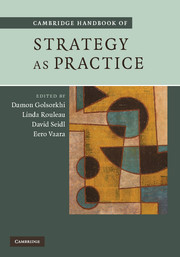Book contents
- Frontmatter
- Contents
- List of figures
- List of tables
- List of contributors
- Introduction: What is Strategy as Practice?
- PART I ONTOLOGICAL AND EPISTEMOLOGICAL QUESTIONS
- PART II THEORETICAL DIRECTIONS
- PART III METHODOLOGICAL TRACKS
- PART IV APPLICATION VARIATIONS
- 18 Institutional change and strategic agency: an empirical analysis of managers' experimentation with routines in strategic decision-making
- 19 Unpacking the effectivity paradox of strategy workshops: do strategy workshops produce strategic change?
- 20 Struggling over subjectivity: a critical discourse analysis of strategic development
- 21 Strategizing and history
- Author Index
- Index
- References
20 - Struggling over subjectivity: a critical discourse analysis of strategic development
Published online by Cambridge University Press: 05 October 2012
- Frontmatter
- Contents
- List of figures
- List of tables
- List of contributors
- Introduction: What is Strategy as Practice?
- PART I ONTOLOGICAL AND EPISTEMOLOGICAL QUESTIONS
- PART II THEORETICAL DIRECTIONS
- PART III METHODOLOGICAL TRACKS
- PART IV APPLICATION VARIATIONS
- 18 Institutional change and strategic agency: an empirical analysis of managers' experimentation with routines in strategic decision-making
- 19 Unpacking the effectivity paradox of strategy workshops: do strategy workshops produce strategic change?
- 20 Struggling over subjectivity: a critical discourse analysis of strategic development
- 21 Strategizing and history
- Author Index
- Index
- References
Summary
Introduction
Discursive perspectives provide opportunities to map out and critically examine some of the most fundamental questions in strategy and strategizing that are not easily approached with more traditional perspectives on Strategy as Practice (Hendry 2000; Knights and Morgan 1991; Seidl 2007; Vaara et al. 2004). This is the case with ‘subjectivity’, which can be understood as a discursively constructed sense of identity and social agency in specific contexts. In their seminal Foucauldian analysis, Knights and Morgan (1991) had already examined how strategy discourse can transform ‘individuals into subjects whose sense of meaning and reality becomes tied to their participation in the discourse and practice of strategy’ (p. 252). Thereafter, other discursive analyses have touched upon subjectivity. In particular, Samra-Fredericks (2005) has shown how organizational identities and power relations are constructed in strategy conversations. Mantere and Vaara (2008) have in turn demonstrated how different strategy discourses construct very different kinds of identities for organizational actors and consequently impede or promote participation. Nevertheless, empirical studies focusing on the discursive construction of subjectivity and its various implications in organizational strategizing are still rare in this area.
In this chapter, we wish to add to this research by examining subjectivity in strategy discourse from a discursive struggle perspective. We approach organizational discourse as a dialectical battle between competing groups (e.g. Mumby 2004). From a discourse struggle perspective, discourses have a great deal of power over individuals, but at the same time individuals can also draw from specific discourses for their own purposes.
- Type
- Chapter
- Information
- Cambridge Handbook of Strategy as Practice , pp. 310 - 325Publisher: Cambridge University PressPrint publication year: 2010
References
- 1
- Cited by



